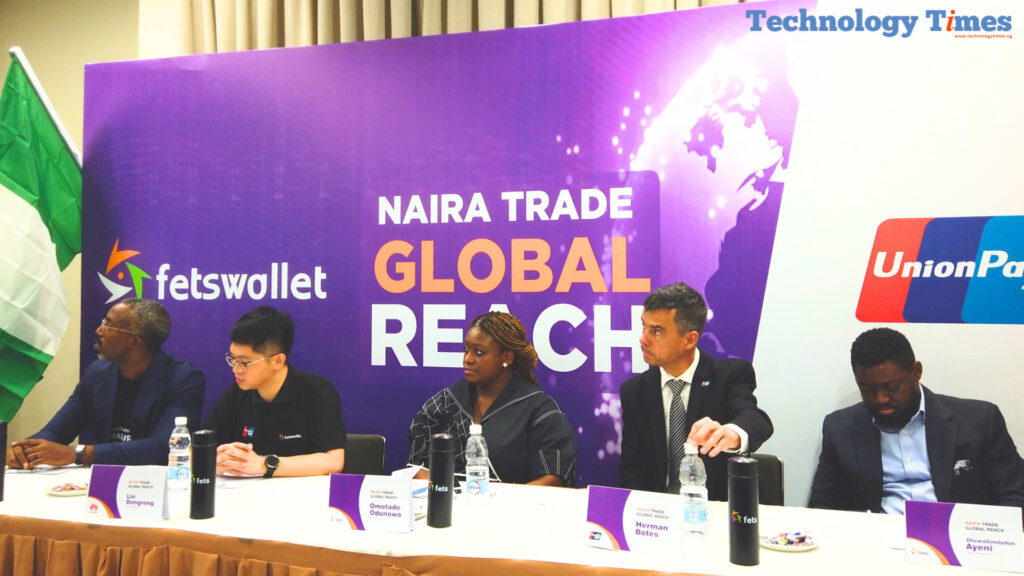Nigeria’s trade with China, estimated at $26 billion in 2022, is to be expanded following a payment technology alliance unveiled today between Funds & Electronic Transfer Solutions Limited (Fets) and UnionPay International (UPI) for the issuance of virtual cards for trade between the two nations, Omotade Odunowo, Fets CEO has hinted.
The FETS CEO who dropped this hint in Lagos today at the official unveiling of the alliance between the Nigerian fintech company, Fets and UnionPay International of China under which they will jointly issue virtual cards through the Fets App to grow the UPI card issuance in Nigeria.
The Fets-UPI card alliance, which has Chineses technology giant, Huawei, as its technology partner, will be tapping into the cross-border trades between the two nations which was estimated to have peaked at $26 billion by 2022.
Odunowo: How Fets-UnionPay tie will boost Nigeria-China trade

The privately-owned Fets will not disclose financial details of its financial projections but the Nigerian fintech explains that the card partnership with UnionPay will open a new vista for trade with China, and also complement the financial inclusion programme of the Central Bank of Nigeria (CBN).
“The first thing is,” the Fets CEO says while fielding questions at the launch of the alliance in Lagos, “UnionPay International is the largest card scheme in the world. They have issued over 200 million cards outside of China. It is accepted in 181 countries and has 2500 members. So that gives you a perspective of its acceptance globally. So that’s in terms of the strength of the partner and the card scheme.”
Secondly, Odunowo adds, “for the competitors, and which I have worked with one of them before, and so looking at the acceptance level globally, UnionPay International is the leading card scheme. What does this mean for Fets? What does this mean for Nigeria and the relationship with China? So looking at the numbers of $26 billion, is it possible to double that in the nearest future?”
“What we’ve done with this product is we have targeted use cases. Some of the use cases are focused on students that are studying in China and have to repatriate money or their parents to pay the school fees and we did the analysis..”
Omotade Odunowo, Fets CEO,
The Fets CEO believes that the goal is achievable considering the conversations and the needs assessments that have been done with different user groups by the Fintech company.
“What we’ve done with this product is we have targeted use cases. Some of the use cases are focused on students that are studying in China and have to repatriate money or their parents to pay the school fees and we did the analysis.,” she says.
“We have also looked at the traders. We have taken Computer Village. We have actually done surveys and looked at the volume of trade that is done there that is not even captured formally. Because a lot of these things that are done like I can send money to my brother and my brother does the shipping for me and all that. So we are going to bring some of these into a formal ecosystem that can be monitored and tracked. So the $26 billion may be an underreporting of the actual volume because a lot of volume is being done in the informal sector.”
Odunowo explains further that, “as a mobile payment operator, one of the core mandates of the Central Bank of Nigeria is to deepen financial inclusion and to extend payment points beyond traditional banks, beyond the bricks and mortars. So beyond trade with China, what we are also doing is to extend payments to places where there are no traditional banks.”
Fets, a leading provider of innovative payment solutions and Union Pay International, a world leader in payment services, promise that Nigerians will benefit for “a full range of payment options by utilising both Union Pay’s vast card acceptance network and Fets’ cutting-edge payment technology through its fetswallet App.”
These solutions,” Fets CEO, Odunowo says, “are made to meet the constantly changing needs of consumers and businesses in a world that is becoming more digitally connected and digitally native,”.

According to her, “we are quite excited to collaborate with Union Pay to offer businesses and customers a more robust payment experience. This partnership with UnionPay International is an opportunity to further drive financial inclusion, and deepen the cashless agenda and strategy of the Central Bank of Nigeria (CBN).”
The Fets-UnionPay partnership, Odunowo says, “will revolutionize our business model and reposition us for more efficiency in meeting the growing needs of our customer base.”
Being the first virtual card issuance in Nigeria with UPI, Mr. Asad Burney, General Manager of UnionPay International Africa Branch says, “we were very happy with this partnership. This partnership is a big step toward our continued goal of providing top-notch payment options. In partnership with Fets, we will enable businesses to prosper in the digital economy while guaranteeing that clients can conduct business in a convenient and safe manner.”
Barney says that, “with the growing trade volume between Africa particularly Nigeria and China, this partnership would leverage on UnionPay’s innovative products offerings, the global UnionPay network to complement innovation drive of fets in electronic payment, financial inclusion and cashless payment within Nigeria.”
Both companies say that they target expanded payment options by giving clients access to a variety of payment options such as digital wallets, virtual cards, and other payment methods. “Furthermore, by accepting payments from clients worldwide, this alliance allows customers to reach a wider audience and more easily penetrate foreign markets,” they say.
Source of Article

